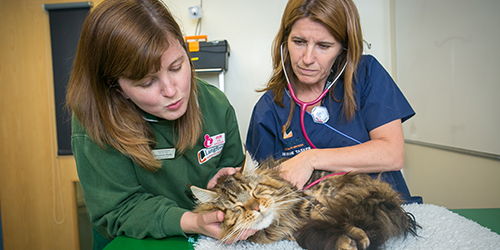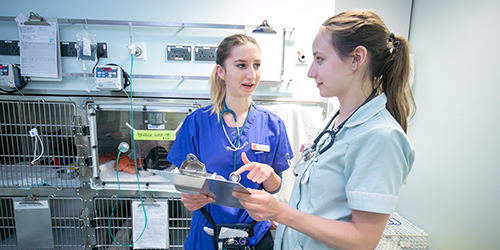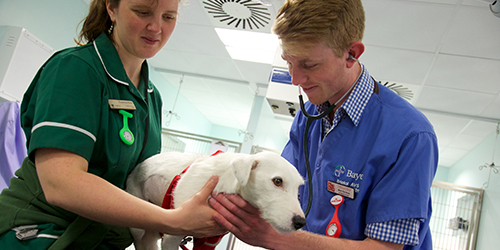Veterinary Nursing
Experience the unique combination of a beautiful rural campus and a vibrant city life. Learn from clinically active experts who will help you to succeed in your career.
Ranked 1st in the UK
Our Veterinary Nursing Animal Behaviour course is ranked number one in the UK by The Guardian’s subject rankings 2024.
Exceptional clinical experience
Bristol is the only vet nursing higher education provider that offers clinical rotations around one of the highest-level small animal referral hospitals in the UK.
Bright career prospects
100% of our veterinary nursing students are in work or further study within 15 months of graduation.
Veterinary Nursing courses for 2025
Single Honours
Veterinary Nursing at Bristol
Ranked number one in the UK by The Guardian’s subject rankings 2024 (Animal Science and Agriculture), our Veterinary Nursing Companion Animal Behaviour course prepares you for life beyond university. You'll be taught by staff from our world-leading Animal Welfare and Behaviour Group and have access to Bristol's renowned clinical skills laboratory.
Taught across both the Clifton campus in central Bristol and our rural Langford campus, you'll gain a diverse student experience. You will study with lecturers who are at the forefront of research developments in companion animal behaviour and will graduate with the specialist knowledge required for prevention, diagnosis and treatment of problematic behaviours in companion animals.
By studying Veterinary Nursing Companion Animal Behaviour at Bristol you will also have access to the incredible facilities onsite and those of our partners. We are also the only veterinary nursing higher education provider to offer clinical rotations around one of the highest-level small animal referral hospitals in the UK, located onsite.
Your degree will enable you to apply to join the RCVS register of veterinary nurses and is the only veterinary nursing degree in the UK that fulfils the academic requirements for accreditation as a Certified Clinical Animal Behaviourist (CCAB). See the course page for terms.
I was blown away by every opportunity the course provided; from the veterinary museum to working alongside specialists at referral hospitals. I have loved the practical classes as well as the interesting academic lectures and I can't wait to do my dissertation. Bristol was the perfect place for me, and I hope future students have as much fun as I did!
Career prospects

You'll graduate with a degree from a prestigious Russell Group university and be equipped for a wide range of career opportunities within animal behaviour and veterinary nursing.
100% of our veterinary nursing students are in work or further study within 15 months of graduation (DiscoverUni).
Bristol's cutting-edge facilities and experts will make you highly employable and prepared for a diverse range of careers, with many graduates occupying senior roles in specialist referral practices.
Alongside opportunities in clinical nursing, you will be ideally placed to work in behaviour and welfare for animal charities and the commercial sector or to continue your practical training to become a Certified Clinical Animal Behaviourist (CCAB).
Opportunities exist in general veterinary practice, specialist veterinary referral hospitals, in veterinary schools, in animal charities and within the business sector.
Some of our graduates also go on to further study leading to a postgraduate qualification.
Course structure

Year one: you will learn the fundamentals of anatomy and mammalian physiology, the underlying principles and practice of veterinary nursing along with an introduction to professional practice.
Year two: you will continue to study anatomy, whilst a clinical veterinary nursing unit introduces anaesthesia and fluid therapy, surgical nursing and theatre practice, medical nursing, diagnostics and therapeutics. You'll study the principles of animal ethology and behavioural development and be introduced to key concepts in clinical behaviour practice.
Placement: to meet the clinical placement requirements of the RCVS, you will spend time in clinical practice during the holiday in years one and two, usually close to your home.
Year three: you will complete a placement year in veterinary practice (currently within a 50-mile radius of Langford) and on rotations in the onsite referral hospital. You'll also study professional veterinary nursing practice through lectures and online tutorials.
Year four: you will undertake units in applied clinical veterinary nursing, clinical skills in companion animal behaviour and a ten-week research project on a topic of your choice, supervised by one or more of our expert academic team.
Professional accreditation

Bristol Veterinary School’s veterinary nursing programme is accredited by the RCVS.
All graduates of this course are eligible to apply to join the Royal College of Veterinary Surgeons (RCVS) Register of Veterinary Nurses.
This course has also been formally validated by CCAB Certification Ltd as delivering the academic elements necessary for an individual to apply for recognition as a Certificated Clinical Animal Behaviourist (CCAB).
Additionally, this programme is an ABTC Recognised Programme and has been formally recognised by the ABTC Programme Recognition Committee as delivering the academic elements necessary for an individual to achieve ABTC recognition as an Animal Behaviour Technician and Clinical Animal Behaviourist.
